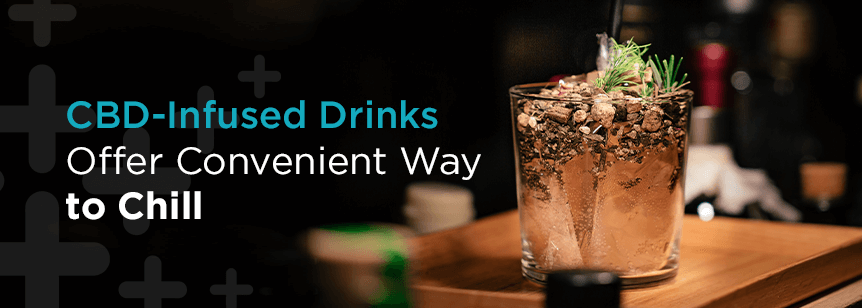
Cannabidiol (CBD) is coming to a bar, coffee shop or bodega near you, if it hasn’t already. CBD beverages are the latest, and some say, the most promising (in terms of popularity and profits) method of CBD consumption to hit the market.
CBD, an extract derived from hemp, is showing up in seltzer, water, coffee, as a mixer, even in wine. US Food and Drug Administration regulations ban interstate commerce in CBD-containing products, so big beverage and beer companies are biding their time to roll out products. But many are busy behind the scenes concocting their own CBD-infused drinks. Heineken has partnered with CannaCraft, a California cannabis producer, to launch Hi-Fi Hops, a non-alcoholic drink with CBD and a touch of THC that’s only available in California and Colorado.
Does drinking CBD provide the same relaxation benefits as taking a CBD gummie or tincture? The answer is maybe, maybe not. Many factors affect how much CBD gets into your bloodstream, beginning with how the CBD is dissolved into the drink, the dose of CBD, and how your body metabolizes it.
The benefit of chugging CBD over other consumption modes is in the experience and convenience. CBD-infused drinks are marketed as functional wellness beverages, akin to energy drinks. Benjamin Witte, founder and CEO of Recess, which makes a sparkly CBD drink, calls CBD the “caffeine of the 21st century.”
The fact is, when you ingest CBD, less than 10% of the dose gets into your bloodstream, and it can take 30 to 90 minutes to feel the effects. Most drinks contain from 10 to 15 milligrams of CBD per serving.
Sublingual tinctures, on the other hand, are readily absorbed through the mucous membranes and faster-acting, but some don’t like the taste, and they are certainly not a grab-and-go option.
CBD is an oil, so it must be processed before it can be mixed with water. “You don’t want it sticking to the sides of a can or floating to the top,” explains Martin Lee, director of Project CBD and author of Smoke Signals. Beverage companies are working on this, using nanotechnology and other high-tech approaches, but it’s not as simple as adding a squirt of CBD to every can of soda.
The other issue is taste. “Cannabis, and especially the terpenes, are bitter and gamey, but drinks need to taste good,” says Lee. To get around the bitter terpenes, companies will likely use CBD isolate rather than the more complex cannabis extracts, but there’s evidence that isolates are not as effective. The so-called “entourage effect” suggests that a full spectrum of cannabinoids enhances the health effects. “From a therapeutic point of view, comparing pure CBD to oils, complex oils are five times more potent than isolate,” says Lee.
One thing you don’t want to do, which Project CBD blogged about, is consume a drink high in sugar to get the benefits of CBD. “You don’t want to make CBD an impetus to drink something unhealthy,” says Lee.
Another question is whether you’re actually getting what the label says is in the can or bottle. That’s a total crap shoot. “You’re going to have some very good products and some so-so products,” Lee says. Studies of CBD-infused pills and food have found that some products have more or less than what the label says. One study of 84 CBD products available on-line found 26% contained less CBD than labeled and 43% contained more. The effects of CBD are subtle, so having a few milligrams more or less is not going to be very noticeable, but since these products are not regulated by the FDA, caveat emptor. Your best bet is to buy products through a legal medical cannabis program in states with legal recreational marijuana, because these products are more likely to be tested for strength and potential toxins.
As with other herbal supplements, do your due diligence and look up on the product’s website whether the drinks are free from pesticides and tested for other contaminants, like lead. You can also check to see if the hemp is grown in the US and certified as organic by the US Department of Agriculture.
Drinks in which CBD is mixed with alcohol or caffeine are among the hottest products on the market, but the jury is still out on the benefits of these cocktails. Some have claimed that spiking whiskey with CBD moderates the negative effects of alcohol. But there’s no evidence to back up these claims, and others argue adding CBD could encourage people to consume more alcohol. As for CBD-infused coffee, there’s anecdotal evidence that CBD takes some of the edge off of the caffeine jitters and gives you a mellower morning boost.
Laurie Tarkan is an experienced health journalist who writes for the New York Times, national magazines including Self, Health, and Glamour, as well as websites such as iVillage, EverydayHealth, and Prevention.
No Information on MarijuanaDoctors.Com should be used to diagnose, treat, prevent or cure any disease or condition. You can view our Full Disclaimer here.